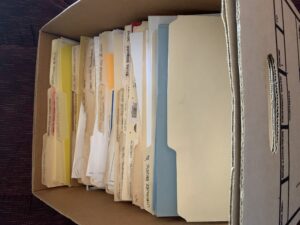 I threw away a bunch of papers today. A simple but difficult task. The simple part was pulling a file folder, flipping through it, and tossing it and its contents in a pile to discard. The difficult task was looking at the pages in many of the files one last time, remembering the significance, and then deciding I didn’t need it any longer. I kept a few folders, but most got tossed.
I threw away a bunch of papers today. A simple but difficult task. The simple part was pulling a file folder, flipping through it, and tossing it and its contents in a pile to discard. The difficult task was looking at the pages in many of the files one last time, remembering the significance, and then deciding I didn’t need it any longer. I kept a few folders, but most got tossed.
The files are from different aspects of my career as a psychologist at a university counseling center. That work involved lots of papers. Papers to read, papers I researched and wrote for presentations (many before computers), notes from professional meetings and contacts, that sort of thing. The papers were just papers with words, but many represented the thought, effort, and emotion I invested in a project. The papers also remind me of the people I worked with, often in close collaboration on projects.
The first thick folder I threw out was my study guide for the license exam. That was 30 years ago. I had scribbled notes all through it as a way to study. The writing was mine, but I understood little of what I had written. What was so important to know and remember at that time about research design and statistics was of little value in my work. The sections on topics like personality theory and cognitive psychology were a bit more useful, but I still remembered little of it as I browsed through the pages. I had to take the exam twice. This first time I missed the cut-off by a few points. That was a dark time.
I had numerous folders on topics that had been major themes of my work, such as grief therapy, working with men, group psychotherapy, and trauma response. Within those folders were lots of journal articles, some of which I had read and underlines sentences, many more I had intended to read but never did. They were as unblemished as the day I got them.
The folders that gave me greatest pause were my reports when I was the head of the center’s trauma response team. Whenever there was a death, suicide, assault, or some other trauma on campus, two members of the team would go to the site and meet with those most directly affected by the event. Of course, it was usually late at night when things like that happen. I remember many of those incidents vividly, meeting with roommates, friends, sorority sisters, or whoever was involved. Often those meetings took place within hours or even minutes of the news getting to the friends.
Those were difficult and often powerful meetings. After each debriefing meeting, I wrote a report, and then a final summary of the team’s work for the semester. “This semester we had 11 deaths on campus…”
Scanning those notes reminded me of colleagues who joined me on those late-night gatherings. With one colleague, we developed the practice of going for ice cream afterward so we could talk about our own reactions to the meetings.
After a few hours of going through those forms, I felt compelled to call one of those colleagues I’d only seen a couple of times in the past two decades, just to say “Hi.” Even after all these years, it’s a good thing to debrief, catch up, remember, and express gratitude for the willingness to go through stuff together.
0 Comments until now
Add your Comment!